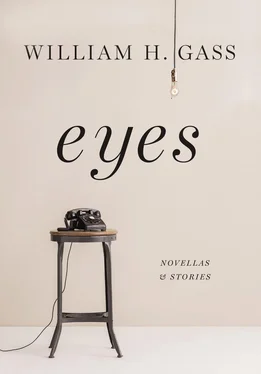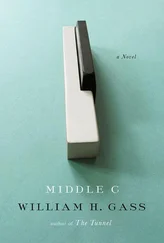The fingernails are especially…Mr. Gab began, because he couldn’t help himself. Ah, and the white above that one hoof, the visitor responded, entranced. Yes, the nails, the gesture of the hand, a confused puff of tail and that wall…such a wall. Hoofprints, Mr. Gab prompted. Dark soft spots…yes…and so…would you consider a trade, the man asked smiling — fully, genuinely — as he laid the cellophane envelope carefully on top of a cardboard box and allowed the print to float down upon it. I might have in my possession — if you have too many, you would know — a Sudek myself I’d be prepared to swap. I couldn’t part — Mr. Gab broke off to repeat himself. Not for trade or sale, though, if the Sudek were fine enough, he, Mr. Gab, might be prepared to purchase…But were you to see the Sudek, the man said, pointing toward his eyes…
It’s a trap, Mr. Gab’s assistant thought, for he only looked a bit stupid, especially with a little dab of spit moistening the open corner of his mouth. It is the immersement, the immersement of the figures in their fore- and back- and floor ground, that is so amazing, don’t you agree? Mr. Gab, unsure, nodded. He’s an entrapper, the assistant thought. I should show you the Sudek, the visitor said, no longer a customer but now a salesman. It sings, sir, sings. I’m willing to look at anything Sudek, Mr. Gab said, over his assistant’s unvoiced series of “no”s. All right, the seller said, slipping his tall frame toward them. After reading Mr. Gab’s expression, the man left abruptly, without leaving a clue to his intentions, and without closing the door behind him.
Had appeared at Mr. Gab’s shop door years ago with a note from the orphanage…okay…from a welfare agency. The note was in fact in a sealed envelope, and the boy, who was at that time about ten or twelve, and wasn’t yet Mr. Gab’s assistant, hadn’t an inkling of its contents. Nor did he care much. He was not then a very caring child. He had seen too many empty rooms filled with kids of a similar disownership of themselves as his. Mr. Gab looked at the envelope handed him and shook his head warily as if he could read through cream. He then conferred upon the child a similar gesture, as if he saw through him too — clear to his mean streak. Here at last, hey! he said. The kid had a pudgy bloataboy body. Half of him, the right half, though undersized, seemed okay; the leftover half, however, had been severely shortchanged. The head sloped more steeply than heads should, a shoulder sank, an arm was stunted, its squat hand had somewhere lost a finger, and the leg was missing most of its length. The child had consequently a kind of permanent lean which a thick woodsoled shoe did little to correct, though the fellow tried to compensate by pushing off with his short leg, and thereby tipping himself up to proper verticality. The result was that he bobbed about as though fish were biting, nibbling at bait hung deeply beneath whatever he was walking on — a sidewalk, lawn, shop floor, cindered ground.
The boy knew that he was being handed over. The lady with him had explained matters, then explained them again, and made silly claims that didn’t fit what little he knew of his own cloudy history. This grouchy stranger, he was told, had been his mother’s husband, but was not known to be his father. The identity of his father remained a mystery. The child’s mother had not done a Dickens on him and died of childbedding, but had come down unto death with influenza when he was allegedly a month or two past the curse of his birth. Cared for by the state from then on. He went from wet nurse to children’s home to foster parents back to children’s home again. No one liked him. He was too ugly.
He appeared to be stupid, and most of what he did was awkward, to say the least. In close quarters he tended to carom. He learned that when you failed to understand something you were blamed for that, but that alone, thus escaping consequences. People would say: well, he didn’t know any better; he’s not all there. Mr. Gab called him “you stupid kid” from the very beginning, and never called him anything else, though he lived with Mr. Gab above the first shop (on the street of his envious enemy) like one of the family if there’d been a family, and in time ceased resenting the name, which was often sweetly drawled — hey-u-stew-pid — and eventually shortened to u-Stu, a result that u-Stu quite liked, though Mr. Gab pointed out that now his name was as out of kilter as u-Stu’s stature and his gait.
In point of fact, there was really nothing the matter with his mind which had somehow scuttled to the right side of his brain when his deformities were being assembled, so when his head got lopped a little on the left, his intelligence remained intact, hiding safely a bit behind and a bit above his bright right eye, and looking out of it with the force of two whole hemispheres.
For his entire life, not omitting now, Mr. Gab’s assistant had watched gazes turn aside, watched notice be withdrawn, watched courses alter in order to avoid the embarrassments of his body: the bob and weave of it, its stunted members, the missing finger, the droopy eye, the little irreducible slobber that robbed his mouth of dignity, and the vacancy of a look that lacked muscle; who wanted to encounter them? face nature’s mistake? pretend you were talking to a normal citizen instead of a mid-sized dope-dwarf? Kids his own age were curious, of course, and would stare holes in his shirt. Neither being ignored nor peered at were tolerable states.
U-Stu’s speech had a slight slur to it on account of some crookedness at the left corner of his mouth and a bit of permanently fat lip in the same place. Simpleminded, most thought him, if they listened at all. He’d talk anyway. Ultimately he took pleasure in producing discomfiture and awkwardness, embarrassment and shame. It suited Mr. Gab to keep him around for the same reason. And he liked the name “Stu” because he felt himself to be a loose assemblage of parts that commingled in his consciousness like diced carrots and chunks of meat in juice. A few, like Boombox, the Russian furrier, would address him directly, but blarefully, so they still wouldn’t see him through the dust-up of their own noise. After all, such folk had business with his master, as the assistant was sure they thought Mr. Gab was. He, on the other hand, was ugh! He was Igor. Who deals in eyes of newts. And brains of bats. Stirs into pots the kidneys of cats.
At first the silence was stifling, Mr. Gab’s directions terse, his look stony; and his assistant was certain that this indifference was an act to cover revulsion; but after a while Mr. Gab began to see u-Stu’s crooked mouth, saw the little bubbles of spit, heard the slur, grew accustomed to the rockabyebounce, and accepted u-Stew’s absent finger as well as the nail that was never there, not hammered off as had been, u-Stu believed, David Smith’s. Then, after further familiarity was achieved, the assistant became invisible again, the way one’s wife fades, or actual son recedes, seen without being seen, heard without hearing, felt without caring, even, when it was the wife, for her plump breast. This was okay in most minds because it was based upon acceptance. Like getting used to handling worms or disemboweling birds. Yet it wasn’t okay to the assistant because the assistant felt he was in fact disgusting — quite — so that if you were to truly take him in you should continue to feel revulsion too: he hadn’t been brought into the world merely to wobble, but to repel people by these means, and at the same time to remind them of their luck in having sailed all — not just portions — of themselves down the birth canal.
The first shop, though it had a finer front, had been much smaller, and the assistant, while yet too young to be much help, had to assist in sleeping, since Mr. Gab talked in his sleep, and snored like a roaring lion, and turned and tossed like a wave, and occasionally punched the air as if he were a boxer in training, so the boy had to shake Mr. Gab awake sometimes, or lie in the dark nearby, listen to his mumbles, and participate in the nightmares, which was one reason why the assistant said, in his own undertone, he has the gift, Gab has, the gift. The boy asked Mr. Gab if he had enemies he was defeating when he poked his pillow or flailed away at the night air, and this question helped Mr. Gab realize that their present sleeping arrangement wasn’t salubrious. After some finagling, he found the space where they did their little business now, and there they established themselves, after making several trips (it was but a few blocks) to trundle cartons of prints on a handcart when it wasn’t raining and if the coast was clear.
Читать дальше












